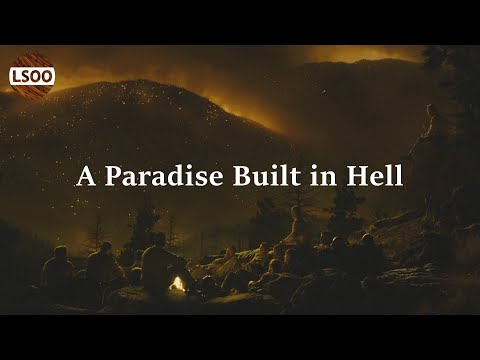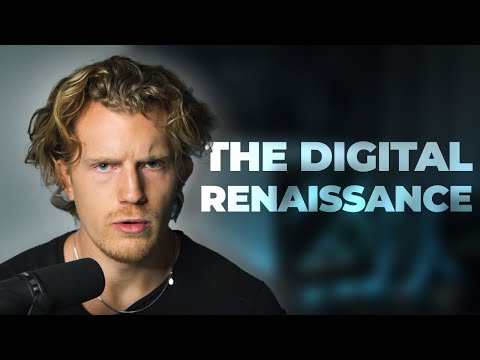Who We Really Are... When Everything Goes Wrong

This video is brought to you by Mubi, an online cinema streaming handpicked exceptional films from around the globe. Get one month free at MUBI.com/likestoriesofold Are we made to take care of each other? Or is it everyone for themselves? It is one of the most fundamental questions about humanity, and looking at the many stories that deal with this question, there seems to be a pervasive belief, though sometimes only implied as a sort of gut feeling, or hidden beneath the antics of a slightly too loveable villain, that deep down, we are on our own. That we are not our brother’s keeper. Everybody is awful these days.
It's enough to make everyone crazy. Your brother left you to die. That's what people do.
Even when proven wrong, when we are shown as decent, cooperative, the belief persists, often expressing itself as the argument that our true nature is mitigated by the comfort of a relatively safe society, that morality and generosity are luxuries that only come to us when the world allows it to. I’ll show you, when the chips are down, these civilized people, they’ll eat each other. This becomes especially clear in post-apocalyptic stories, which explore exactly what would happen when we are stripped of all securing structures, released from all rules, laws and constraints, when our human nature is laid bare, and our true selves are revealed. More often than not, the mirror we’re presented with shows an image of human beings who are fundamentally selfish, aggressive and suspicious of each other, who exist in a world where, when all safeguards are down, it is every man for himself, where might is right, and kindness a weakness to be exploited. Just help him. He's gonna die. He's gonna die anyway.
It is a rather depressing reflection, and disheartening for those who hope for a better future. And it really is a matter of hope too, because how can we imagine a brighter tomorrow, how can we envision real progress, when our civilization is this fragile? When it always seems to be on the brink of falling apart? Or, as Walter M. Miller asks in his novel A Canticle for Leibowitz: “if we are born mad, where is the hope of heaven?” But what if this belief about our human nature is mistaken? What if we are wrong about who we really are? Over the course of human history, there have been countless attempts to uncover the roots of human behavior, to understand our most fundamental nature, our blueprint, as it were. One influential philosopher on this subject was Thomas Hobbes. Hobbes is most well-known for his social contract theory, as presented in his famous work: Leviathan. Social contract theory assumes that the lives of human beings were by nature, in his words; “solitary, poor, nasty, brutish, and short.”
To put it more eloquently, he argued that humans need some form of governance to keep themselves in check. “For as long as men live without a common power to keep them all in awe,” – he wrote – “they are in the condition known as ‘war’; and it is a war of every man against every man.” By war he didn’t necessarily mean a war with active combat, violence and destruction. Rather, it is more of a state of continuous tension, of human beings living with fear of and suspicion towards each other. In this state, there would be no trust, no cooperation. There would be no society.
And so he argued for the need of social contracts, the need for agreements, laws, treaties, for codes of conduct that allow us to build a civilization, that allow us to co-exist in peace. You see, their morals, their code, it's a bad joke. Dropped at the first sign of trouble. Basically, it is a perspective that views civilized society as extremely fragile, and believes that human beings, without the presence of social contracts, would regress to a more primal state, that they would become either vicious or victims.
People are dumb, panicky dangerous animals and you know it. Although Hobbes was not the only philosopher to propose a theory like this, and is therefore not solely responsible for turning this view of humanity into a common assumption, his work does adequately capture the essence of this belief which is still prevalent in so many stories today, especially those that involve calamities, disasters, or other events that break the everyday structures of our society. So the cops are gone and all of a sudden you wanna shoot everybody? Well, yeah. In many of these stories, we see humans acting in panic, we see them becoming greedy, hostile, sometimes even downright hysterical.
Needless to say, it is pretty obvious to see what the dominant belief is about who we are when all social contracts are broken. We are inherently a violent species. Wars, genocide, murder. The denial of our true selves is the problem. But according to author Rebecca Solnit, this image of the selfish human being that instantly regresses to savage behavior in times of disaster has little truth to it. In her book A Paradise Built in Hell, Solnit covers decades of research on human behavior in times of disaster, from the bombings of World War 2, to earthquakes, floods and hurricanes across the world.
And what she found was that, for one; there is no such thing as human nature, at least not in the sense that Hobbes argued. There is no default set of behaviors that we automatically and universally fall back to when things go wrong. Even when stripped of all comforts and constraints, we all react in fundamentally different ways. What do you need? - Albuterol And among those many different ways in which we can react, she also found that, contrary to popular belief, most people actually show qualities like generosity and empathy, they show courage and kindness. “In the wake of an earthquake, a bombing, or a major storm,” – she writes – “most people are altruistic, urgently engaged in caring for themselves and those around them, strangers and neighbors as well as friends and loved ones.”
And I walked over the bridge and there was 10, 15, 20 feet over water everywhere. And you could start to hear the people screaming from their balconies and rooftops. We see such a response in the documentary When The Levees Broke, which shows the myriad of ways in which ordinary people came to each other’s aid in the aftermath of hurricane Katrina. Not just those who were directly affected by the disaster, but from as far away as Texas, hundreds of citizens came to rescue of those in need, providing evacuation, and other necessities like food, clothes and shelter.
There were citizen first responders, there were people in neighborhoods who were carrying children and women and older people out on their backs, on their shoulders, making makeshift rafts. But alot of just, everyday people were out there, from all walks of life, really putting their life on the line, diving in water, bringing out, in particular people with Alzheimer's and dementia We had an elderly lady back there, and Nicholas, my nephew and another 2 kids, I think it was 3 kids alltogether. And we was just going to get the stuff, helping the people out, day by day, we was bringing people to the bridge.
These acts were, as Solnit would describe it, at once nothing special and a miracle. Chaos and deprivation turned into order and abundance by will, empathy and resourcefulness. The response to Katrina was one that was overwhelmingly defined by this selflessness, bravery and love for our fellow human beings. For Rutger Bregman, the author of Humankind: A Hopeful History, it was but one of many examples that led him to propose the thesis that: "most people, deep down, are pretty decent.” Like Solnit, Bregman too bases his argument on a long history of documented human responses to disaster, all of which demonstrate how we tend to remain calm instead of panic, how we are more likely to become altruistic instead of selfish.
They prove how the acts of kindness that disaster stories tend to frame as exceptional are actually not so exceptional at all, how you are in fact more likely to encounter helping hands than hostile others, and how generally, a crisis brings out not the worst, but the best in us. The real reason all this is so important is because, as both authors also point out; beliefs matter. How we view ourselves and those around us strongly affects our attitude and our actions.
“Often the worst behavior in the wake of a calamity is on the part of those who believe that others will behave savagely and that they themselves are taking defensive measures against barbarism.” I’m just gonna assume you’re all criminals, because if we’re honest, you probably are. In other words, if disasters reveal our generally good nature, they also reveal how the failure to believe in it can make things much, much worse.
Solnit wrote that the first rat to infect a disaster is rumor, and during Katrina the destructive consequences of this became painfully evident. The national media reported rampant rumors. Man, they were flying all over the place and nobody could verify them. Stories of violent crimes and savagery spread like wildfire, thereby turning people in need into people to be afraid of, people to be rescued into people to be kept away. Official rescue operations became heavily stifled, sometimes even replaced with active hostility as military forces were being deployed not to take care of victims, but to enforce law and order against an imagined enemy. They were gonna put armed police there, and they were gonna turn you back at gunpoint.
This was Jefferson parish police lined up with shotguns would not let us cross that bridge, made us go back. Salvation turned to damnation, and a disaster caused by nature turned into an even greater one of our own doing. There were people who were injured just seeking refuge, who could not get through and who were told, by their own government, that they were not allowed in. Of course, as the later investigations found, most of these rumors that ended up denying people their much needed care were completely false. There was some looting going on, but even those reports were exaggerated.
In fact, Solnit found that opportunistic theft and burglary are historically rare in American disasters, rare enough to be considered one of the myths of disaster. Though it is one that nevertheless tends to be perpetrated by stories about them. How come you took this bunch prisoner? - Suspicion of looting. Scum like you think you can get away with anything. Push people around when you want to, steal when you want to, make fun of men who have to work for a living, not today! And besides, as Solnit argues: “who cares if electronics are moving around without benefit of purchase when children’s corpses are floating in filthy water and stranded grandmothers are dying of heat and dehydration?” It is noteworthy how this lack of faith in humanity, and the concern with material goods over the safety of human lives generally doesn’t arise from the bottom up, but rather from the top down, meaning that the selfish and panicky behavior we generally assume in times like these manifests itself not so much among ordinary citizens, but among those in positions of power and influence.
I want every man, woman and child to understand how close we are to chaos. I want everyone to remember why they need us! In their research, Rutgers University professors Caron Chess and Lee Clarke coined the term ‘elite panic’ to conceptualize the specific conflicts that arise during a disaster not because of panic among the masses of ordinary citizens, but because of panic among a minority of elites. “The distinguishing thing about elite panic as compared to regular-people panic,” – Chess said – “is that what elites will panic about is the possibility that we will panic.” As Solnit also points out, what people in privileged positions tend to fear most is losing those positions. They fear disruption of the social order, they fear challenges to their legitimacy.
And as she puts it; disasters provide both, lavishly. Our power comes from the perception of our power. Do you understand the damage this has done? Do you understand what’s at stake? In a way, their fear is valid. Historically, disasters have more than once resulted in significant social change. After Chernobyl’s nuclear catastrophe for example, the poor response from the Soviet Union, as depicted here in the HBO series Chernobyl, directly contributed to the rise of Ukrainian nation-building, which ultimately played a major role in the collapse of the Soviet Union.
This is what has always set our people apart, a thousand years of sacrifice in our veins, and every generation must know its own suffering. In another example, the Mexico earthquake of ’85 led to great dissatisfaction among the people with their one party system. As Professor of History Burton Kirkwood stated: “Out of the disaster emerged the realization that a viable civil society existed in Mexico. This revelation also caused many to consider why they needed a centralized state that so obviously could not care for its people.”
It is interesting to consider how exactly disasters can lead to social change, for it is not just because disasters have a tendency to reveal the flaws of a societal system, and the shortcomings of safeguarding institutions. It is also because disasters reveal something deeper about ourselves that we tend to forget under normal circumstances. They reveal something fundamental about who we really are. I’m just so damn proud. We did this together. We were a team.
One remarkable observation made by Solnit was that most people not only become altruistic and caring during disasters, but also that they do it with so much joy. Joy, in this sense, doesn’t refer to some light or shallow experience of happy feelings, which obviously would be hard to imagine in the face of great loss and devastation. Rather it is about a deeper experience of belonging and solidarity, of connecting to otherwise neglected needs for community and purpose.
“The positive emotions that arise in those unpromising circumstances demonstrate that social ties and meaningful work are deeply desired, readily improvised, and intensely rewarding.” It is a feeling that you may have experienced to some degree during small ruptures in everyday life, like during a power outage or when you become stranded somewhere because of heavy snowfall. It is in those moments where you find yourself almost automatically gravitating towards those around you, be they friends, family or even total strangers.
You might say this is simply because extraordinary events tend to invoke a reaction, but on deeper level, what it really reveals is that, when faced with uncertainty and potential trouble, we naturally turn to each other, we ready ourselves into a position where, if needed, we can receive and provide help. This is not to say, as Solnit also emphasizes, that we should welcome disasters, but we can value the responses as they help us understand more about who we are, and, just as important, what we are supposed to do. With the world so set on tearing itself apart, it don't seem like such a bad thing to me to want to put a little bit of it back together. The work of psychiatrist Viktor Frankl also reflects our deep longing for community and connection as he argued that, above anything else, we are driven by a desire for purpose; by a desire for meaning beyond our own individual selves.
Fundamentally, naturally, primarily, any human being is concerned with something out there in the world, is concerned with someone out there in the world, a work to do, a job to complete, a task, a meaning, a mission in life waiting for him. You’ll do it, because it must be done. There’s no hiding from this son, we have a job to do. And finally, this he doesn’t do for himself, but he’s doing it for the sake of a cause to serve, or another person to love, and never, never for himself only. You're safe now.
Like the authors mentioned before, Frankl too saw there was no innate blueprint for human behavior. As a holocaust survivor, he witnessed humanity stripped to its essence in the concentration camps, and observed how, despite living under the most terrible conditions, there were still men walking around comforting others, and giving away their last piece of bread. He realized that human beings have a fundamental inner freedom, one that no force on earth could take away, the freedom to choose, to choose hope when all seems lost, to choose bravery and decency even when you have nothing left to give.
Secondly, he realized that people like these, the ones who placed themselves in service of others, who committed themselves to a greater cause, were the ones who found nourishment even in complete depravation, who kept their fire burning even in total darkness. In short, he realized what we are meant to do. “For the first time in my life” – Frankl wrote – “I saw the truth as it is set into song by so many poets, proclaimed as the final wisdom by so many thinkers. The truth — that love is the ultimate and the highest goal to which man can aspire.”
I think this is the reason why stories of bravery and sacrifice tend to resonate so strongly, especially when they involve ordinary citizens. They are reminders of who we know we can be, of who we want to be. They are antidotes to a culture of toxic individualism, cynicism and general self-centeredness, a culture that dismisses collective meaning in favor of individual gains, that sees altruism only as a personal expense, not as a source of fulfillment, as something from which you receive as much as you give. You help me as much as I help you. And for that, I am grateful. The real challenge then is to bring this sense of solidarity and meaning that so often arises out of disaster into the realm of the everyday.
For as Solnit puts it, utopia is in trouble these days. Many people no longer believe that a better world is possible, and that the best thing they can achieve, is a better life for themselves, and for themselves alone. But again, beliefs matter. And changing the way we view ourselves also affects how we view our potential, our future. As Bregman points out, there are a lot of realistic measures that aren’t held back by a lack of technology, money or other necessary infrastructures, but by a simple lack of faith in humanity, by a system built on fear that is constantly creating more to be afraid of.
These measures only seem radical when you assume the worst about humanity, but obvious when you belief in the best. And as many disasters have shown us, there are good reasons to believe in the best, to have real hope for humanity. But “hope in this sense is not a prize or a gift,” – Solnit adds – “but something you earn through study, through resisting the ease of despair, and through digging tunnels, cutting windows, opening doors, or finding the people who do these things. They exist.” What is it you think you can do out there? It is not just us. The call went out. We aren't the only ones to answer, you know. This, perhaps, is the real utopia, not some meticulously planned, eternal vacation existing only in the imagination of a painfully distant reality, but one that is already observable here and now. That lies waiting in the shadows, and arises when we need it most.
A utopia of individuals and organizations driven by love instead of cynicism, of people who, even our darkest moments, always succeed in holding back the apocalypse through sheer will and decency, who always defeat our cynicism through kindness and care, always mitigate our fears through empathy and solidarity. It is the paradise built in hell. The paradise in which, as Solnit concludes, we are who we hope to be, do the work we desire, and are each our sister's and brother's keeper. As stated before, beliefs matter. And the stories we tell about ourselves can play an important role in shaping them. Truly thoughtful and empathic cinema however can be hard to find, and for that, I’m really glad I have MUBI.
MUBI is a curated streaming service showing handpicked exceptional films from around the globe. Every day, they present a new film, whether it's a timeless classic, a cult favorite, or an acclaimed masterpiece, there’s no better way to explore the riches of cinema. They feature hundreds of carefully selected films that dive into the nature of humanity, and you can try it for free for 30 thirty days by going to MUBI.com/likestoriesofold. So be sure to claim your extended free trial, and begin your month of great cinema today.
2020-12-21 05:45


